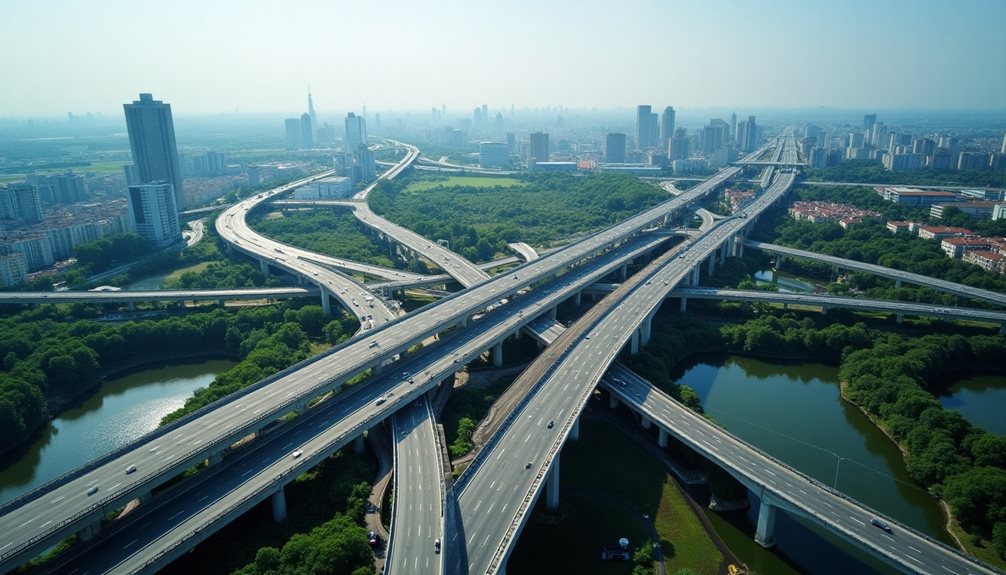Understanding transportation infrastructure vocabulary in Russian is essential for effective communication within the transportation sector. Key terms related to roads, railways, and airports form the foundation of this specialized language. Mastery of these terms can greatly enhance navigation and operational efficiency. Furthermore, familiarity with urban transportation language and safety terminology is critical. The implications of this vocabulary extend beyond mere communication, influencing the overall effectiveness of transportation networks. What other nuances might emerge in this situation?
Table of Contents
ToggleKey Terms for Roads and Highways

The terminology associated with roads and highways is fundamental for understanding transportation infrastructure in Russia. Key terms include various road signs and highway markings that regulate traffic flow and guarantee safety.
Road signs, such as warning, regulatory, and informational signs, communicate critical information to drivers, facilitating informed decision-making while on the road.
Highway markings, including lane dividers, pedestrian crossings, and directional arrows, provide visual guidance and maintain organizational order on highways.
Understanding these terms allows individuals to navigate the complex network of roads effectively. This knowledge is crucial for promoting autonomy in transportation, fostering a sense of freedom for travelers while enhancing overall road safety and efficiency within the Russian transportation system.
Transportation Infrastructure Vocabulary in Russian: Terms for Transportation Networks
| Russian (Cyrillic) | English Phonetic | English Definition |
|---|---|---|
| Транспортная инфраструктура | Transportnaya infrastruktura | Transportation infrastructure |
| Транспортная сеть | Transportnaya set’ | Transportation network |
| Дорога | Doroga | Road |
| Автомобильная дорога | Avtomobil’naya doroga | Highway / Motorway |
| Железная дорога | Zheleznaya doroga | Railway |
| Железнодорожная сеть | Zheleznodorozhnaya set’ | Railway network |
| Метро | Metro | Subway / Metro |
| Аэропорт | Aeroport | Airport |
| Автовокзал | Avtovokzal | Bus station |
| Морской порт | Morskoy port | Seaport |
| Железнодорожный вокзал | Zheleznodorozhny vokzal | Train station |
| Трамвай | Tramvay | Tram / Streetcar |
| Троллейбус | Trolleybus | Trolleybus |
| Транспортный узел | Transportny uzel | Transport hub |
| Магистраль | Magistral | Main road / Trunk road |
| Пешеходная дорожка | Peshekhodnaya dorozhka | Pedestrian walkway |
| Велосипедная дорожка | Velosipednaya dorozhka | Bicycle lane |
| Автобусный маршрут | Avtobusny marshrut | Bus route |
| Транспортное средство | Transportnoye sredstvo | Vehicle |
| Грузовой транспорт | Gruzovoy transport | Freight transport |
Essential Vocabulary for Railways
Railway infrastructure relies on a specific vocabulary that is crucial for understanding its operation and safety protocols. Terms such as “track gauge” (ширина колеи, shírina koléi), “signals” (сигналы, sígnaly), and “rolling stock” (подвижной состав, podvízhnoi sostáv) form the foundation of effective communication within the railway sector.
Additionally, “railway safety” (железнодорожная безопасность, zheleznodorózhnaya bezopásnost’) encompasses guidelines and procedures essential for preventing accidents and ensuring secure travel. The terminology surrounding “train schedules” (расписание поездов, raspisánie poézdov) is equally important, as it dictates the timing and coordination of train movements, affecting both efficiency and passenger experience.
Knowledge of these terms enables stakeholders, from engineers to operators, to navigate the complexities of railway systems effectively. This vocabulary not only facilitates operational clarity but also supports a culture of safety and reliability within the transport network.
Airport Terminology in Russian
Airport infrastructure operates with a specialized vocabulary that is crucial for effective communication and safety within the aviation sector.
This terminology encompasses various aspects of airport facilities and adherence to aviation regulations, facilitating seamless operations. Understanding these terms is essential for professionals and travelers alike.
- Терминал (Terminal): The main building where passengers check in and board flights.
- Взлетно-посадочная полоса (Runway): The designated area for aircraft to take off and land.
- Зона безопасности (Security Area): The controlled area where security checks are conducted.
Mastering airport terminology guarantees clarity in interactions, enhances operational efficiency, and promotes compliance with international aviation standards.
Ultimately, this contributes to the safety and convenience of air travel.
Urban Transportation Language
Urban transportation language encompasses a range of specialized terms critical for effective navigation and communication within city transit systems. Understanding these terms is essential for enhancing public transit efficiency and supporting urban planning efforts.
| Term | Definition | Application |
|---|---|---|
| Route | A defined path taken by a transit service | Guides passengers and operators |
| Stop | Designated location for boarding or alighting | Facilitates passenger access |
| Transfer | Change from one transit line to another | Enhances connectivity between services |
| Fare | Charge for using public transportation | Determines cost of travel |
| Schedule | Timetable for transit services | Helps plan journeys |
Familiarity with urban transportation language fosters informed decisions, ultimately contributing to more sustainable urban environments.
Common Phrases for Navigating Russian Transportation Systems
Maneuvering transportation systems requires familiarity with essential phrases that facilitate communication and understanding. Effective navigation of public transport relies on a few key phrases that can enhance the travel experience.
Acquiring these phrases not only aids in comprehension but also fosters a sense of independence while exploring new environments.
- “Where is the nearest station?”
- “What time does the bus arrive?”
- “Can I buy a ticket here?”
These expressions serve as critical travel advice for individuals aiming to traverse complex transportation networks. Mastery of such vocabulary empowers travelers to engage confidently with local systems, ensuring a more seamless and enjoyable journey.
Navigating transportation systems in Russia can be challenging for English speakers, especially if you are not familiar with the language or the specific terms used. Below is a guide with useful phrases, examples, and a list of related Russian terms that will help you get around more confidently.
Useful Phrases for Getting Around
Asking for Directions
- Где находится метро?
Gde nakhoditsya metro?
Where is the metro? - Как добраться до аэропорта?
Kak dobrat’sya do aeroporta?
How can I get to the airport? - Сколько стоит билет?
Skol’ko stoit bilet?
How much is a ticket? - Когда отправляется следующий автобус?
Kogda otpravlyaetsya sleduyushchiy avtobus?
When does the next bus leave?
Buying Tickets
- Мне, пожалуйста, билет до центра.
Mne, pozhaluysta, bilet do centra.
One ticket to the city center, please. - Можно купить проездной?
Mozhno kupit’ proyezdnoy?
Can I buy a transit pass? - Где я могу обменять билет?
Gde ya mogu obmenyat’ bilet?
Where can I exchange/take a ticket?
On Public Transport
- Это мой выход?
Eto moy vykhod?
Is this my stop? - Можно выйти здесь?
Mozhno vyyti zdes’?
Can I get off here? - Этот автобус идёт до станции Парк Культуры?
Etot avtobus idyot do stantsii Park Kultury?
Does this bus go to Park Kultury station?
Russian Terms for Transportation
| Cyrillic | English Phonetic | English Definition |
|---|---|---|
| метро | metro | metro/subway |
| автобус | avtobus | bus |
| троллейбус | trolleybus | trolleybus |
| поезд | poyezd | train |
| билет | bilet | ticket |
| станция | stantsiya | station |
| остановка | ostanovka | stop (bus or tram stop) |
| расписание | raspisaniye | schedule |
| маршрут | marshrut | route |
| выход | vykhod | exit |
| вход | vkhod | entrance |
| платформа | platforma | platform |
| пересадка | peresadka | transfer/change (transport) |
| касса | kassa | ticket office |
| проездной | proyezdnoy | transit pass |
Ultimately, a command of these phrases contributes to a liberating travel experience, enabling greater exploration and interaction.
Frequently Asked Questions
What Are the Differences Between Public and Private Transportation in Russian?
The differences between государственный транспорт and частный транспорт encompass factors such as accessibility, cost, and operational control. Public transport is often subsidized and widely available, while private transport emphasizes individual choice and flexibility.
How Do I Ask for Transportation Directions in Russian?
To ask for transportation directions in Russian, one should use navigation apps effectively. This involves entering the destination and selecting the desired mode of transport, facilitating clear communication of travel needs to locals.
What Words Are Used for Different Types of Vehicles in Russian?
The inquiry into types of vehicles reveals various vehicle classifications, including легковой автомобиль (passenger car), грузовик (truck), автобус (bus), and мотоцикл (motorcycle). Each term provides precise identification within the transportation sector, facilitating effective communication and understanding.
How Do I Describe Traffic Conditions in Russian?
To describe traffic conditions in Russian, one might reference terms indicating traffic congestion and road safety. Understanding these concepts facilitates effective communication regarding urban mobility challenges and promotes awareness of critical issues affecting daily commutes.
What Phrases Are Useful for Emergency Situations in Transportation?
In emergency situations, understanding emergency protocols and utilizing safety equipment is essential. Phrases that clarify procedures, request assistance, or identify hazards can greatly enhance response effectiveness and guarantee personal safety during transportation incidents.



